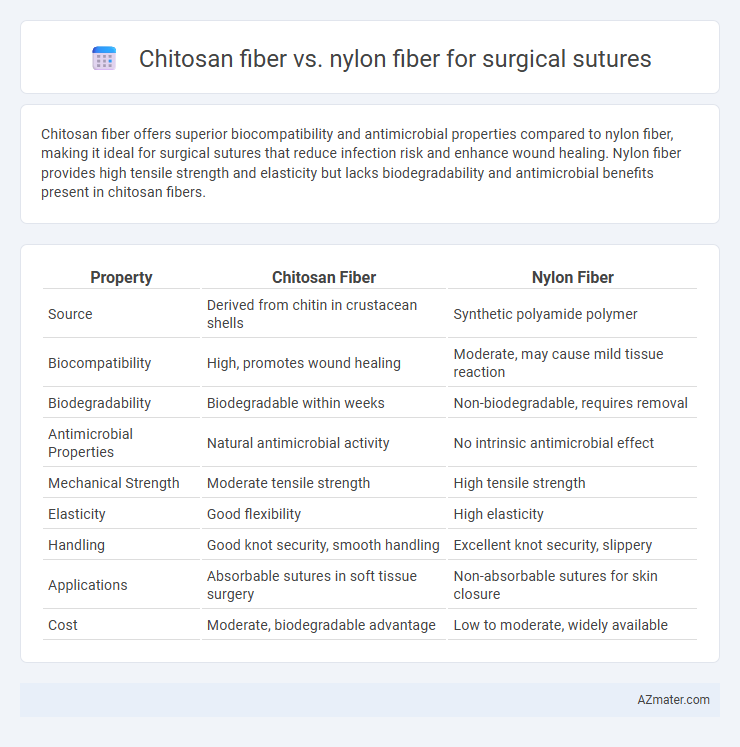Chitosan fiber offers superior biocompatibility and antimicrobial properties compared to nylon fiber, making it ideal for surgical sutures that reduce infection risk and enhance wound healing. Nylon fiber provides high tensile strength and elasticity but lacks biodegradability and antimicrobial benefits present in chitosan fibers.
Table of Comparison
| Property | Chitosan Fiber | Nylon Fiber |
|---|---|---|
| Source | Derived from chitin in crustacean shells | Synthetic polyamide polymer |
| Biocompatibility | High, promotes wound healing | Moderate, may cause mild tissue reaction |
| Biodegradability | Biodegradable within weeks | Non-biodegradable, requires removal |
| Antimicrobial Properties | Natural antimicrobial activity | No intrinsic antimicrobial effect |
| Mechanical Strength | Moderate tensile strength | High tensile strength |
| Elasticity | Good flexibility | High elasticity |
| Handling | Good knot security, smooth handling | Excellent knot security, slippery |
| Applications | Absorbable sutures in soft tissue surgery | Non-absorbable sutures for skin closure |
| Cost | Moderate, biodegradable advantage | Low to moderate, widely available |
Introduction to Surgical Sutures
Surgical sutures are critical for wound closure and tissue healing, requiring high biocompatibility and strength. Chitosan fiber, derived from natural biopolymers, offers superior biodegradability, antimicrobial properties, and enhanced tissue regeneration compared to synthetic nylon fiber. Nylon fiber, made from polyamide, provides excellent tensile strength and flexibility but lacks biodegradability, making it less ideal for absorbable suture applications.
Overview of Chitosan Fiber
Chitosan fiber, derived from chitin found in crustacean shells, is a biodegradable and biocompatible material widely used in surgical sutures due to its natural antimicrobial properties and excellent hemostatic ability. Unlike nylon fiber, which is synthetic and non-biodegradable, chitosan fiber promotes wound healing by enhancing cell adhesion and reducing infection risk. Its biopolymer structure supports tissue regeneration while minimizing inflammation, making it a superior choice for absorbable surgical sutures.
Overview of Nylon Fiber
Nylon fiber is a synthetic polymer widely used in surgical sutures due to its high tensile strength, elasticity, and biocompatibility. It exhibits excellent resistance to abrasion and minimal tissue reaction, making it suitable for both internal and external wound closures. Compared to chitosan fiber, nylon offers superior durability and consistent performance, though it lacks the natural antimicrobial properties inherent to chitosan.
Mechanical Strength Comparison
Chitosan fiber exhibits a unique combination of biocompatibility and biodegradability but generally demonstrates lower tensile strength compared to nylon fiber, which is known for its superior mechanical durability and high tensile strength in surgical sutures. Nylon fibers provide excellent knot security and resistance to elongation under stress, making them a preferred choice for applications requiring strong and stable wound closure. Chitosan fibers, while advantageous for promoting healing and reducing infection risk, may require reinforcement or blending with synthetic fibers to match the mechanical performance of nylon in high-stress surgical environments.
Biocompatibility and Tissue Response
Chitosan fiber exhibits superior biocompatibility compared to nylon fiber due to its natural polymer structure, promoting enhanced cellular adhesion and accelerated wound healing. The biodegradability of chitosan allows for gradual absorption, reducing chronic inflammation and minimizing foreign body reactions often associated with nylon sutures. Tissue response to chitosan sutures typically involves lower fibrotic encapsulation and improved antimicrobial properties, making it advantageous for surgical applications requiring optimal tissue integration.
Absorbability and Degradation
Chitosan fiber exhibits superior absorbability and biodegradability compared to Nylon fiber, making it highly suitable for surgical sutures that require gradual absorption by body tissues. Its natural polysaccharide structure enables enzymatic degradation within weeks, reducing foreign body reactions and promoting wound healing. Nylon fiber, a synthetic polymer, is non-absorbable and remains intact in the body unless surgically removed, which can increase the risk of infection or inflammation over prolonged periods.
Antimicrobial Properties
Chitosan fiber exhibits superior antimicrobial properties compared to nylon fiber, effectively inhibiting bacterial growth and reducing the risk of postoperative infections in surgical sutures. Its natural biocompatibility and biodegradability enhance wound healing while minimizing inflammation. In contrast, nylon fiber lacks inherent antimicrobial activity, often necessitating the incorporation of external antimicrobial agents to prevent infection.
Handling and Knot Security
Chitosan fiber demonstrates superior biocompatibility and antimicrobial properties compared to nylon fiber, enhancing wound healing during surgical sutures. In terms of handling, chitosan fibers offer excellent pliability and softness, reducing tissue trauma, whereas nylon fibers provide higher tensile strength but are relatively stiffer. Knot security is typically better with chitosan due to its natural adhesion properties, while nylon may require additional knots or coatings to prevent slippage in surgical applications.
Clinical Applications and Performance
Chitosan fibers exhibit superior biocompatibility and antimicrobial properties, making them highly suitable for surgical sutures in wound healing and infection prevention. Nylon fibers offer excellent tensile strength and elasticity, providing reliable wound support but lack inherent bioactivity, which may delay tissue regeneration. Clinical studies highlight chitosan's enhanced hemostatic effect and reduced postoperative complications compared to traditional nylon sutures.
Future Trends in Surgical Suture Materials
Chitosan fiber exhibits excellent biodegradability, antimicrobial properties, and biocompatibility, positioning it as a promising alternative to nylon fiber in future surgical sutures. Nylon fibers offer high tensile strength and durability but lack bioresorbability, which limits their long-term integration in tissue healing. Emerging trends emphasize the development of hybrid sutures combining chitosan's bioactive benefits with nylon's mechanical stability to enhance wound healing and reduce infection risks.

Infographic: Chitosan fiber vs Nylon fiber for Surgical suture
 azmater.com
azmater.com